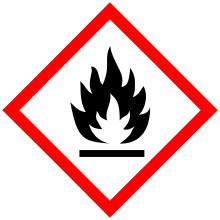Does cannabis extract obtained from cannabis flowers with maximum allowed residual level of aflatoxins and ochratoxin A have an impact on human safety and health?
Contents


A flammable liquid is a liquid which can be easily ignited in air at ambient temperatures, i.e. it has a flash point at or below nominal threshold temperatures defined by a number of national and international standards organisations.
The Occupational Safety and Health Administration (OSHA) of the United States Department of Labor defines a liquid as flammable if it has a flash point at or below 93 °C/199.4 °F.[1] Prior to bringing regulations in line with the United Nations Globally Harmonized System of Classification and Labeling of Chemicals (GHS) in 2012, OSHA considered flammable liquids to be those with a flash point below 37.8 °C/100 °F. Those with flash points above 37.8 °C/100 °F and below 93.3 °C/200 °F were classified as combustible liquids.[2][3] Studies show that the actual measure of a liquid's flammability, its flash point, is dependent on the local air pressure, meaning that at higher altitudes where the air pressure is lower, the flash point is also lower.[4]
Categorization
Both OSHA and GHS further divide flammable liquids into 4 categories:
- Category I flammable liquids are those with boiling points ≤ 35 °C/95 °F and flash points < 23 °C/73 °F[1][5]
- Category II flammable liquids are those with boiling points > 35 °C/95 °F and flash points < 23 °C/73 °F[1][5]
- Category III flammable liquids are those with flash points > 23 °C/73 °F and ≤ 60 °C/140 °F[1][5]
- Category IV flammable liquids are those with flash points > 60 °C/140 °F and ≤ 93 °C/199.4 °F[1][5]
These categorizations are dependent upon a set altitude and atmospheric pressure, as both boiling point and flash point change with changes in pressure.[4]
Labeling
Both GHS and OSHA require the labeling of flammable liquids, on containers and safety data sheets, as follows:[3][5]
| Category I | Category II | Category III | Category IV | |
|---|---|---|---|---|
| Symbol | Flame | Flame | Flame | none |
| Signal Word | Danger | Danger | Warning | Warning |
| Hazard Statement | Extremely flammable liquid and vapour | Highly flammable liquid and vapor | Flammable liquid and vapour | Combustible liquid |
See also
References
- ^ a b c d e "1910.106 - Flammable liquids. | Occupational Safety and Health Administration". www.osha.gov. Retrieved 2019-03-06.
- ^ "But It Wasn't Flammable Before! GHS Changed the Meaning of 'Flammable Liquids'". EHS Daily Advisor. 2015-09-23. Retrieved 2019-03-08.
- ^ a b "HCS/HazCom 2012 Final Rule & Appendices | Occupational Safety and Health Administration". www.osha.gov. Retrieved 2019-03-08.
- ^ a b Ding, Chao; Yao, Wei; Tang, Yanfei; Rong, Jianzhong; Zhou, Dechuang; Wang, Jian (March 2014). "Experimental study of the flash point of flammable liquids under different altitudes in Tibet plateau". Fire and Materials. 38 (2): 241–246. doi:10.1002/fam.2177. S2CID 137412493.
- ^ a b c d e Globally harmonized system of classification and labelling of chemicals (GHS). United Nations. Economic Commission for Europe. Secretariat. (Seventh revised ed.). New York. 2017. ISBN 9789211171310. OCLC 994197992.
{{cite book}}: CS1 maint: location missing publisher (link) CS1 maint: others (link)


















